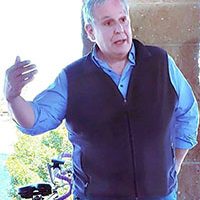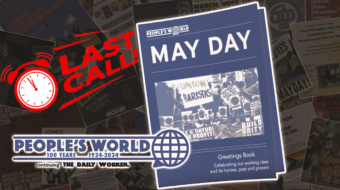
Here are just a few stories about the impact made by Pete Seeger on a single one of the millions of people who were influenced by him during his long, creative, inspiring and productive life. Pete died on Monday at age 94.
One: in 1968 or 1969 I was a young radical in Seattle. Pete Seeger was coming to town to perform at the Moore Theater, a benefit for the American Friends Service Committee, if my memory serves. I couldn’t afford a ticket, but the AFSC was looking for volunteer ushers in return for free admission. I signed up.
While the crowd was beginning to gather, before I had to be on duty, I stood outside the theater selling copies of the old People’s World, at that time the Communist Party’s West Coast newspaper. I sold a few, and then saw Pete Seeger walking up the block, carrying his banjo case. He stopped, told me it was good to see young people doing what I was doing, and gave me a few bucks for a copy of the paper. Later I went in, ushered a bit, then sat down on some steps next to other patrons, and sang along with every single song he played, since I had grown up in the ’50s and ’60s listening to all his records, including relatively obscure ones like “American Industrial Ballads.”
Two: My mother, Virginia Brodine, was the main mover in creating the first Environmental Commission of the Communist Party. She drafted the first edition of our environmental program, “People and Nature Before Profits.” She wrote to Pete, asking for a comment that could be used on the back cover, and he sent one. Later, however, he must have gotten some heat from friends who didn’t approve of the party, and he wrote Mother a snippy note saying he hadn’t understood his words would be used on the pamphlet. Mother was a bit hurt, but being an organized person, she kept all her correspondence, and was able to find the original letter she had sent Pete, specifically asking for a quote that could be used to promote the program. She sent Pete a copy, and he sent back a gracious note apologizing for his faulty memory.
Three: My first wife took a photo of our first child at about three years old, “reading” a copy of the People’s World. My former mother-in-law, BJ Mangaoang, was a leader of the Communist Party in Washington State for many decades., and got her hands on a copy of the photo. She took it with her to a meeting in New York, and while there attended the massive Nuclear Freeze demonstration at the United Nations, in I believe 1980. She ran into Pete.
They had some history. When BJ was a young radical, in the early 1940s, she had been asked to drive Pete and Woody Guthrie around the Seattle area to various union meetings so they could perform. She ended up singing with them a bit, so whenever she ran into Pete, they shared warm memories from that trip. So when she ran into him at the big demonstration, she pulled out a copy of the photo to show him her grandchild, and Pete gave her an autograph on the back. We still have that photo. That’s three degrees of connection – Pete to BJ Mangaoang to my daughter to me.
I also had a hundreds-of-thousands of degrees experience, when on the night before Obama’s first inauguration, Pete got called up to the stage of the pre-inaugural public concert by Bruce Springsteen, and they sang Woody’s “This Land is Your Land” including the “forgotten” verse about private property. I wasn’t there with the hundreds of thousands assembled before the Lincoln Memorial; I just saw it on television. But that moment was symbolic, for me personally and for the nation as well.
So Pete Seeger was a mentor, even though I only met him in person for a minute or two one time. His songs provided the soundtrack for my childhood, his music helped inspire me to learn guitar and folk songs from cultures different from the one I grew up in. His activism and passionate opposition to the Vietnam War connected me emotionally to the struggles I was going through at that time, first as a conscientious objector to the draft and then as a peace activist in the People’s Coalition for Peace and Justice.
He played a similar role in the lives of literally millions of people around the world, through endless touring, through record albums, through his fight to get his antiwar song “Waist Deep in the Big Muddy” played on network TV, through his early environmental activism to save the Hudson River, and so much more. We honor his life, and acknowledge his influence, in our lives and also in the political and cultural life of our country.
Photo: A young Pete Seeger sings at the racially integrated Valentine’s Day opening of the Washington labor canteen, sponsored by the United Federal Workers of America, Congress of Industrial Organizations (CIO), in then-segregated Washington, D.C., Feb. 13, 1944. First Lady Eleanor Roosevelt, center, was the honored guest. Joseph A. Horne/Office of War Information/Library of Congress












Comments